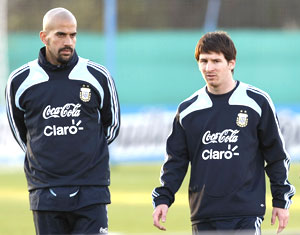Barcelona, who provide the backbone for World Cup favourites Spain and will be parading Ballon d'Or winner Lionel Messi, are the team to beat at the Club World Cup that kicks off this week in Abu Dhabi.
Estudiantes, winners of the old Intercontinental Cup in 1968 and finalists twice more, are the old hands going in the 11-day tournament and favourites to meet Barcelona in the final.
 Africa's TP Mazembe, Asia's Pohang Steelers and Atlante of Mexico will be aiming to topple the giants from the two continents that have dominated world football.
Africa's TP Mazembe, Asia's Pohang Steelers and Atlante of Mexico will be aiming to topple the giants from the two continents that have dominated world football.
"We know well that it's a fight like David against Goliath and we'd be very naive if we didn't realise that," said Atlante's experienced Argentine winger Santiago Solari speaking of a potential meeting with Barcelona.
Solari, a River Plate player when the Argentine side reached the final of the old Intercontinental Cup in 1996, helped Real Madrid lift the trophy in Tokyo against Olimpia in 2002.
Before Atlante can face Barcelona, though, they have to beat the winners of a preliminary match between Oceania champions Auckland City and host club Al Ahli, who kick off the tournament on Wednesday.
Barcelona and Estudiantes have a bye into the semi-finals next week when the Argentine side will make their bow against Mazembe of the Democratic Republic of Congo or South Korea's Steelers.
NECESSARY HOMEWORK
Estudiantes, like Barcelona, are careful not to take a semi-final success for granted and have been studying their potential opponents carefully.
"Today you turn the TV on and see a Barcelona match, maybe the coach (Alejandro Sabella) will pay more attention, but it's not the same as analysing a team from Africa," Estudiantes captain Juan Sebastian Veron told Reuters in La Plata.
Carles Puyol, who was in the Barcelona side that lost the 2006 final to Internacional of Brazil, echoed that sentiment when he said: "They are teams less known to us, they're not Spanish or European, so for that reason we'll study them well."
The name Veron links Estudiantes' past winners with today's team. His father Juan Ramon was in the side that lifted the Intercontinental Cup against Manchester United in 1968.
It is United's crown the teams playing in Abu Dhabi will be vying for after Wayne Rooney's goal gave the English side a 1-0 win over Ecuador's LDU Quito in last year's final in Yokohama.
FIFA have handed the tournament to the United Arab Emirate of Abu Dhabi, with its two impressive stadiums, Mohammed bin Zayed and Zayed Sports City, after holding it in Japan for the last four years.
Asia has taken big strides into the world of top level football this decade with the highlight staging the World Cup in Japan and South Korea in 2002.
FINANCIAL CLOUT
The region's financial clout could eventually help to propel one of its teams into the Club World Cup final where this month's winners will pocket $5 million.
Pohang Steelers are a young club, founded in 1973, with a long-standing coach in Brazilian Sergio Farias, who has been in charge since 2005.
Farias has won praise for his attacking mentality and his success with the Steelers has led to calls for him to be named manager of the national team after the 2010 World Cup.
Tout Puissant (all powerful) Mazembe forward Deo Kanda, quoted on the club's website (www.tpmazembe.com), said: "You can't apply mathematics any more to football today.
"We are champions of Africa and we'll defend ourselves without fear against the big clubs of the planet."
Auckland City of the amateur New Zealand league have one small advantage over their bigger opponents in that they have been to the tournament before. A coup for them would be to beat Al Ahli and progress to a meeting with Atlante.
"When we went to Japan in 2006 we had to change our coach four weeks out from the tournament and we were unfit," club chairman Ivan Vuksich told the club website (www.aucklandcityfc.com).
"I swore then that if we got another chance we would be extremely well prepared."







